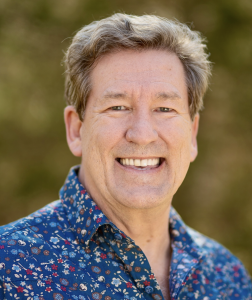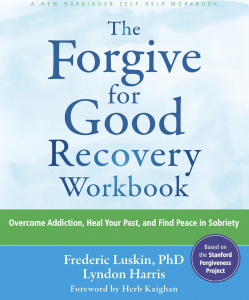
Dr. Frederic Luskin and Lyndon Harris Debunk Addiction Myths with 'The Forgive for Good Recovery Workbook' – Out Now!
Misconceptions about addiction delay treatment and hinder recovery by preventing early intervention and support.
LOS ANGELES, CA, UNITED STATES, March 31, 2025 /EINPresswire.com/ -- Frederic Luskin, Ph. D., a leading expert in the science of forgiveness, and Lyndon Harris, a respected recovery advocate, have released their new book, The Forgive for Good Recovery Workbook: Overcome Addiction, Heal Your Past, and Find Peace in Sobriety, which is now available to the public. This transformative workbook aims to dispel common misconceptions about addiction while strengthening the recovery process.
To purchase a copy of this transformative workbook, click here: https://bit.ly/41MEZPy
Research shows that addiction myths hinder early treatment and prolong suffering. According to Psychology Today, ignoring research-based evidence prevents crucial intervention and leads to ineffective treatment strategies. Addiction Group says that between 40% and 60% of individuals treated for substance use disorders will relapse at least once. Despite this, over 93% of people with a past-year substance use disorder did not receive specialty treatment.
Common Misconceptions About Addiction:
-Teen Drug Use Is Not Normal or Safe: Experimentation with drugs, including marijuana, can harm adolescent brain development, leading to long-term mental health and behavioral issues. Experts advocate for a zero-tolerance approach.
- Addiction Is Not a Personal Weakness: Genetic, environmental, and neurological factors influence addiction. Research shows it is a complex brain disease, not just a matter of willpower.
- People Don’t Need to Hit 'Rock Bottom' to Recover: Intervention and treatment can be effective at any stage. Delaying treatment increases risks to health, relationships, and employment.
- Addiction Treatment Can Work: While definitions of success vary, programs like Alcoholics Anonymous (AA) and medical treatments have helped many recover. The most significant barrier to treatment is denial.
- Drug Overdoses Can Cause Brain Damage: Overdosing on opioids and other drugs can lead to hypoxic brain injury, memory loss, and cognitive impairment. The rise in fentanyl-related overdoses has made this issue even more critical.
Harris says, “Our expertise bridges the gap between psychological healing and recovery advocacy, offering a comprehensive and practical guide to overcoming addiction. By integrating forgiveness techniques with proven recovery strategies, this workbook takes an innovative approach to addressing the emotional and mental barriers often in the way of lasting recovery.”
He adds, “Recovery is not just about breaking free from addiction; it’s about rebuilding a life with purpose, strength, and self-compassion. This workbook provides the structure and support necessary for lasting change.”
“We created this workbook to empower individuals with the tools they need to heal and move forward. Forgiveness is a crucial part of the recovery journey, and when we let go of resentment and self-blame, real transformation can occur,” Luskin informs.
About Dr. Frederic Luskin:
Dr. Frederic Luskin is a co-founder of the Stanford Forgiveness Projects and the Department Chair of Clinical Psychology at Sofia University. He teaches Positive Psychology, Forgiveness, Meditation, and Wellness at Stanford and co-founded Life Works and Wellness Education at Stanford Medicine. A leading expert on forgiveness and best-selling author of Forgive for Good and Forgive for Love, Dr. Luskin’s research highlights forgiveness's mental and physical health benefits, especially for trauma survivors.
About Lyndon Harris:
Lyndon Harris, a former priest, began his journey to forgiveness at Ground Zero on September 11, 2001, supporting first responders and their families. His efforts have been featured in major publications like The New York Times, The Washington Post, and the PBS documentary The Power of Forgiveness. Harris is now a global advocate for forgiveness, sharing his message worldwide.
Follow Forgive for Recovery on Facebook:
https://www.facebook.com/groups/866360625470412/?hoisted_section_header_type=recently_seen&multi_permalinks=882931210480020
Check Forgive for Recovery out on Instagram:
https://www.instagram.com/forgiveforrecovery/
Amanda Kent
Boundless Media USA
+1 313-403-5636
email us here
Distribution channels: Book Publishing Industry, Culture, Society & Lifestyle, Human Rights, Media, Advertising & PR, Social Media
Legal Disclaimer:
EIN Presswire provides this news content "as is" without warranty of any kind. We do not accept any responsibility or liability for the accuracy, content, images, videos, licenses, completeness, legality, or reliability of the information contained in this article. If you have any complaints or copyright issues related to this article, kindly contact the author above.
Submit your press release


